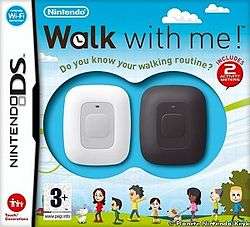Personal Trainer: Walking
| Personal Trainer: Walking | |
|---|---|
 PAL region box art | |
| Developer(s) |
Nintendo NSD Creatures Inc. |
| Publisher(s) | Nintendo |
| Director(s) |
Naoya Morimuta Hirofumi Matsuoka Toyohisa Tanabe |
| Producer(s) |
Kiyoshi Mizuki Shinya Kawada |
| Designer(s) | Takayuki Nakayama |
| Programmer(s) | Kazunari Usui |
| Artist(s) |
Kazuya Yoshioka Yuka Kotaki |
| Composer(s) | Yasumasa Yamada |
| Platform(s) | Nintendo DS |
| Release date(s) | |
| Genre(s) | Exergaming |
| Mode(s) | Single-player |
Personal Trainer: Walking, known in PAL regions as Walk with me! Do you know your walking routine? and in Japan as Aruite Wakaru Seikatsu Rhythm DS (歩いてわかる 生活リズムDS), is an exergaming application developed by Nintendo Network Service Development (Nintendo NSD) and Creatures Inc. for the Nintendo DS. The pedometer accessory was developed in-house at Nintendo NSD, while the software portion was developed in conjunction with Nintendo NSD, Creatures Inc., and Engines.
It is part of both Nintendo's Touch! Generations brand and Personal Trainer series.[1] As it is one of the very few Nintendo DS titles that support the use of Mii characters.
Overview
Personal Trainer: Walking allows up to four users to track their walking, jogging or running activities through a series of graphs, charts and statistics, as well as set goals for themselves. The game is packaged with two infrared pedometers that communicate to the game the user's walking data. Additional pedometers will be sold separately.[2][3]
The game uses Miis to track each user's progress, and allows users to either create a Mii in-game (A first for the Nintendo DS), or wirelessly transfer an existing Mii from a Wii console's Mii Channel to their Nintendo DS.[4] The game also features a number of minigames to unlock, and users can also upload their data online via the Nintendo Wi-Fi Connection to add to weekly leaderboards and a world step count that plots a virtual trek across the solar system.[5]
Reception
Official Nintendo Magazine scored the game 75%, noting the health benefits of exercising and addictiveness of following statistics, but also noted the inherent pointlessness of the game.[6]
The game sold 26,000 copies in its first week of release in Japan.[7]
See also
- List of Nintendo DS games
- Personal Trainer: Cooking
- Personal Trainer: Math
- Brain Age: Train Your Brain in Minutes a Day!
- Brain Age 2: More Training in Minutes a Day!
References
- ↑ Nintendo Launches Personal Trainer: Cooking For Nintendo DS
- ↑ Nintendo Pedometer Is For DS Walking Game
- ↑ Stroll through some Personal Trainer: Walking screens
- ↑ Personal Trainer: Walking Brings Mii Making To The DS
- ↑ Personal Trainer: Walking heads to Europe as ‘Walk With Me’ - dated for Feb. 20th
- ↑ ONM: Walk With Me review
- ↑ Japanese software sales - Oct. 27th to Nov. 2nd